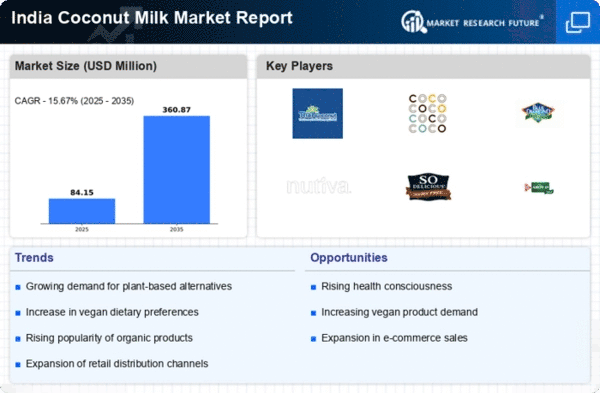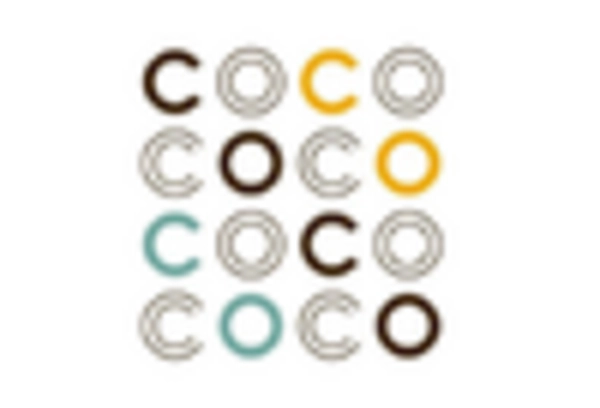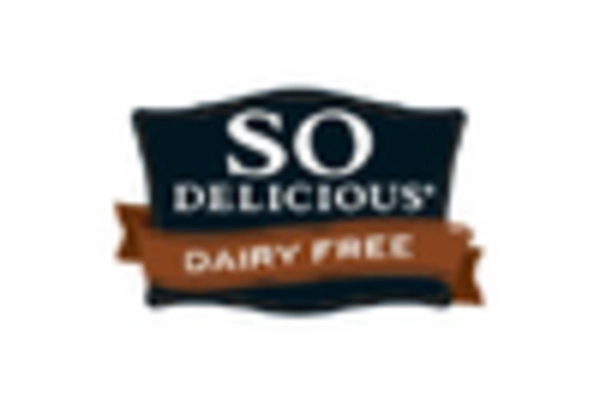Culinary Versatility of Coconut Milk
Coconut milk's versatility in culinary applications is another compelling driver for the coconut milk market. It is increasingly being used in various Indian cuisines, from curries to desserts, enhancing flavors and providing a creamy texture. The rise of veganism and vegetarianism in India has further propelled the use of coconut milk as a substitute for dairy in traditional recipes. This adaptability not only caters to diverse dietary preferences but also encourages innovation in product offerings. The coconut milk market is likely to see a rise in demand as more consumers experiment with coconut milk in their cooking, potentially increasing market penetration by 20% over the next few years.
Health Consciousness Among Consumers
The increasing awareness of health and wellness among consumers in India appears to be a significant driver for the coconut milk market. As individuals become more health-conscious, they are actively seeking alternatives to traditional dairy products. Coconut milk, known for its low calorie content and lactose-free nature, is gaining traction among those with dietary restrictions or preferences. Reports indicate that the demand for plant-based milk alternatives has surged, with coconut milk witnessing a notable increase in consumption. This trend is likely to continue as more consumers prioritize health benefits, potentially leading to a market growth rate of around 15% annually. The coconut milk market is thus positioned to benefit from this shift towards healthier dietary choices.
Sustainable and Ethical Consumption Trends
The growing emphasis on sustainability and ethical consumption is influencing the coconut milk market in India. Consumers are increasingly aware of the environmental impact of their food choices, leading to a preference for plant-based products. Coconut milk, being a renewable resource, aligns well with these values. The coconut milk market is likely to benefit from this trend as more consumers seek products that are not only healthy but also environmentally friendly. Market data suggests that the demand for sustainable food products is expected to grow by 25% in the coming years, indicating a strong potential for coconut milk as a preferred choice among eco-conscious consumers.
Rising Urbanization and Changing Lifestyles
Urbanization in India is rapidly transforming lifestyles, which in turn is impacting the coconut milk market. As more people move to urban areas, there is a shift towards convenience and ready-to-use food products. Coconut milk, available in various packaged forms, caters to this demand for convenience. Additionally, urban consumers are more exposed to global food trends, including the popularity of coconut milk in smoothies and health drinks. This shift in lifestyle is likely to drive the coconut milk market, with projections indicating a growth rate of approximately 18% as urban consumers increasingly incorporate coconut milk into their diets.
Increased Availability of Coconut Milk Products
The expansion of distribution channels and increased availability of coconut milk products is a crucial driver for the coconut milk market. Retailers are increasingly stocking a variety of coconut milk brands, making it more accessible to consumers. E-commerce platforms are also playing a significant role in this expansion, allowing consumers to purchase coconut milk conveniently from home. This increased availability is likely to enhance consumer awareness and encourage trial, which could lead to a rise in market share for coconut milk products. The coconut milk market is expected to see a growth of around 22% as more consumers gain access to these products through diverse retail channels.
















